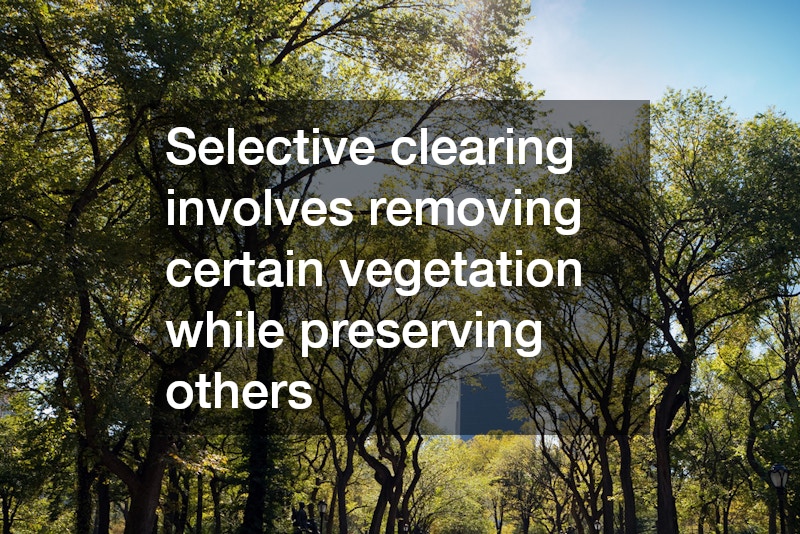When preparing your property for construction or landscaping, hiring a professional land clearing service is a crucial step. However, understanding the right questions to ask can help you make an informed decision. This article explores the essential inquiries to discuss with your local service provider.
What Services Are Included in the Land Clearing Process?
One of the first aspects to understand is the different land clearing methods your service provider offers. Techniques like selective clearing, grubbing, and mulching each have their specific purposes and benefits.
Understanding these techniques can ensure that the service fits the unique needs of your project.
Selective clearing involves removing certain vegetation while preserving others, which is ideal for minimally invasive projects. Grubbing, on the other hand, is a more thorough process that involves removing roots and stumps entirely. Mulching turns vegetation into mulch on-site, enhancing soil health and leaving the ground ready for landscaping.
Beyond these methods, it’s important to know if the service provider can handle tasks such as tree removal or underbrush clearing. Each method has its necessary equipment and precautions, and choosing the right one often depends on project scope and environmental goals. Discuss these options with multiple providers to grasp the pros and cons of each approach.
The specific equipment and machinery used play a vital role in the land clearing process. From bulldozers to smaller machinery like skid-steer loaders, the right equipment influences the efficiency and quality of the job. Make sure the equipment is suitable for the size and terrain of your land.
Different projects require different machinery, and knowing what’s available can help in making an informed decision. For instance, using bulldozers is ideal for large-scale clearing, while more intricate jobs might require precision tools. Confirm that the service provider’s equipment aligns with the requirements and scope of your project.
Additionally, it’s crucial to know whether the machinery is well-maintained and if the operators are adequately trained. Reliable equipment minimizes the risk of delays and ensures a high standard of work. Confirming these aspects can help in averting potential setbacks during the project.
How Much Does Land Clearing Cost?
Several factors can influence the cost of land clearing services, including land size and vegetation density. Larger areas or denser vegetation typically incur higher costs due to the increased labor and equipment needed. It’s also important to consider any additional services that may be required, such as debris removal or topsoil preservation.
Estimates can vary based on geographical location and environmental considerations. Some areas may require more stringent regulations, which can affect both the methods used and final cost. Be sure to discuss these factors during initial consultations with potential service providers.
A crucial step is identifying whether there are any hidden costs or additional fees. Service providers should offer transparent pricing, including any potential charges for unforeseen circumstances. Clarifying these elements helps in financial planning and creating a realistic budget for the project.
To ensure you have a clear understanding of costs, obtain a comprehensive quote from each service provider. This quote should list out each service provided, the associated costs, and the project timeline. An in-depth quote helps in understanding exactly what you are paying for and prevents any unexpected expenses.
Additionally, some service providers offer flexible payment plans or discounts for larger projects. Explore these options to see what financial accommodations might be available. This could include bulk pricing or reduced rates for repeat clients.
Being equipped with a detailed quote also positions you to better negotiate terms or compare pricing among different services. Breakdown quotations allow for a clear comparison of cost and services. Make sure the provider is willing to explain any part of the quote that you don’t understand fully.
What Is the Expected Timeline for Land Clearing?
Setting an expected timeline for the land clearing project is fundamental for effective planning. Typically, timelines will vary based on project scale, with small plots taking a few days and more extensive lands requiring several weeks. It’s advisable to discuss these expectations upfront with your service provider.
Service providers should give you an estimated start and completion date for the project. Ensure timelines align with your scheduling needs, especially if the work is part of a broader construction plan. Understanding average timeframes helps prevent scheduling conflicts or delays in subsequent project phases.
Working with a flexible provider who can adjust schedules if necessary can be beneficial. Discuss the policy for rescheduling, particularly if delays are caused by unforeseeable circumstances. This ensures continuity and minimizes disruptions to your larger project timeline.
Several elements can impact the timeline of land clearing, including weather conditions and site access. Inclement weather can cause delays, especially during seasons known for wet or unpredictable conditions. Factoring in these delays is crucial when planning your project timeline.
Another potential factor is the acquisition of necessary permits. Permit processing times can vary, and delays in approval can affect when land clearing can commence. Therefore, it’s important to discuss permit requirements and acquisition timelines with your service provider early in the process.
Unforeseen obstacles like deep-rooted stumps or hazardous materials can also impede progress. Discuss these possibilities with your service provider to ensure they have contingency plans in place. These factors should be addressed in initial assessments to allow for accurate timeline estimations.
Asking the right questions when hiring a land clearing service is vital to ensure the job is carried out effectively and meets your project requirements. By understanding the scope of services, costs, and timelines, you can confidently select the right provider for your needs. This ensures that your property is prepared efficiently and professionally, laying the groundwork for your project’s success.






